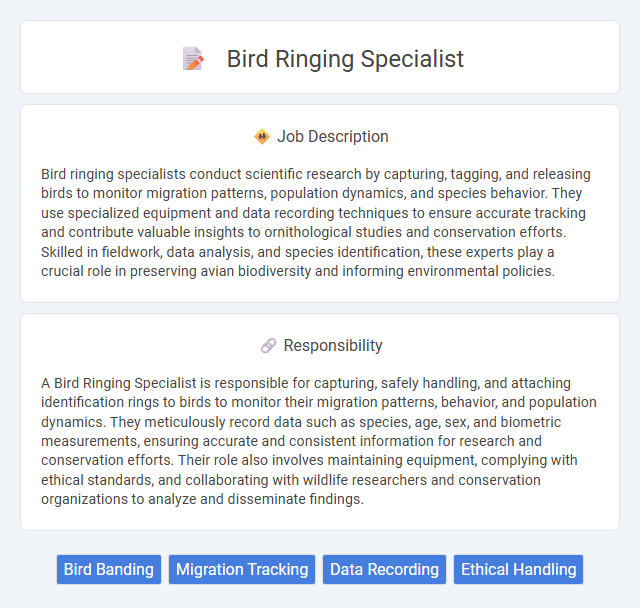
Bird ringing specialists conduct scientific research by capturing, tagging, and releasing birds to monitor migration patterns, population dynamics, and species behavior. They use specialized equipment and data recording techniques to ensure accurate tracking and contribute valuable insights to ornithological studies and conservation efforts. Skilled in fieldwork, data analysis, and species identification, these experts play a crucial role in preserving avian biodiversity and informing environmental policies.
Individuals with a keen interest in ornithology and strong observational skills are likely suitable for a bird ringing specialist role. Those comfortable working outdoors in various weather conditions and possessing patience for meticulous data collection may find the job well-matched to their abilities. Candidates with a preference for detailed fieldwork and minimal routine desk tasks might be better suited for this specialized position.
Qualification
A bird ringing specialist requires a strong background in ornithology or wildlife biology, often holding a bachelor's or master's degree in these fields. Practical experience in bird handling, identification, and data recording is essential, alongside proficiency with ringing equipment and adherence to ethical and legal guidelines. Certification from recognized ornithological organizations, such as the British Trust for Ornithology (BTO), enhances credibility and career prospects.
Responsibility
A Bird Ringing Specialist is responsible for capturing, safely handling, and attaching identification rings to birds to monitor their migration patterns, behavior, and population dynamics. They meticulously record data such as species, age, sex, and biometric measurements, ensuring accurate and consistent information for research and conservation efforts. Their role also involves maintaining equipment, complying with ethical standards, and collaborating with wildlife researchers and conservation organizations to analyze and disseminate findings.
Benefit
Bird ringing specialists likely gain valuable skills in data collection and species identification, enhancing their expertise in ornithology and wildlife conservation. They may benefit from unique opportunities to work in diverse natural habitats, contributing to important ecological research and monitoring. This role probably offers a sense of fulfillment through direct involvement in bird preservation and environmental stewardship.
Challenge
Bird ringing specialists likely encounter the challenge of accurately capturing and tagging diverse bird species without causing stress or harm. Precise data recording and maintaining consistent monitoring may prove difficult due to unpredictable weather and bird migration patterns. The role probably involves adapting methods to various habitats while ensuring compliance with conservation regulations.
Career Advancement
Bird ringing specialists gain valuable experience in avian research methods, data analysis, and species identification that enhances their expertise in ornithology. Career advancement often involves roles such as senior ecologist, wildlife biologist, or conservation program manager, where leadership and project coordination skills become critical. Pursuing certifications in wildlife management and engaging with conservation networks further accelerates progression to specialized research positions or academic roles.
Key Terms
Bird Banding
Bird ringing specialists perform precise bird banding procedures to monitor avian populations, migration patterns, and lifespan. They apply uniquely coded rings to birds' legs, collect biometric data, and analyze movement trends to inform conservation strategies. Expertise in species identification, safe handling techniques, and data management is essential for effective bird banding research.
Migration Tracking
Bird ringing specialists play a crucial role in migration tracking by safely capturing, tagging, and releasing birds to monitor their movement patterns across regions. Using uniquely coded rings, they collect vital data on migration routes, stopover sites, and seasonal behaviors, contributing to conservation efforts and ecological research. Their expertise in handling diverse bird species and interpreting tracking data enables a deeper understanding of avian migration dynamics and environmental impacts.
Data Recording
Bird ringing specialists meticulously record data on bird species, age, sex, and migration patterns to monitor avian populations and behaviors. They use standardized databases and GPS technology to ensure accurate tracking and analysis of bird movements over time. This detailed data recording supports conservation efforts and scientific research on biodiversity and ecosystem health.
Ethical Handling
A Bird Ringing Specialist ensures the ethical handling of birds by adhering to strict guidelines that minimize stress and avoid harm during capture and tagging. They use specialized equipment and techniques designed to protect bird welfare while collecting accurate data for scientific research. Comprehensive training in species identification, behavior, and habitat is essential to maintain high standards of ethical practice throughout the ringing process.
 kuljobs.com
kuljobs.com